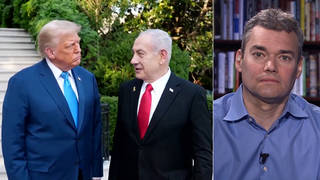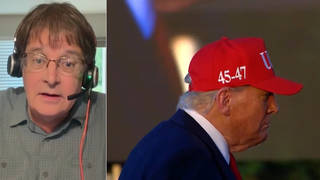
Topics
Guests
- Paul SullivanPersian Gulf War veteran, executive director of the National Gulf War Resource Center based in Washington, D.C.
- Dennis Bernsteinhost of a daily public affairs show at Pacifica station KPFA in Berkeley, wrote an article in the summer issue of Covert Action magazine on Saddam Hussein’s biological weapons and the U.S. companies that sold them to him.
The United States is seeking Middle East states’ support today for possible airstrikes against Iraq, while Russia launched a last-ditch round of diplomacy to prevent another Gulf War. U.S. Secretary of State Madeleine Albright arrived in Saudi Arabia and denied suggestions she was getting no Arab support for possible military action.
But Washington seemed unlikely to be able to forge the kind of broad military coalition of Arab and Western armies it led in 1991. Apart from Kuwait, only Britain has so far thrown its weight unconditionally behind the United States. Now as British jets are sent to a carrier in the Mediterranean and American troops prepare for war, a conversation with reporter Dennis Bernstein and Persian Gulf War veteran Paul Sullivan about Saddam Hussein’s biological weapons and the U.S. companies that sold them to him.
Transcript
AMY GOODMAN: You’re listening to Pacific Radio’s Democracy Now! I’m Amy Goodman.
Secretary of State Madeleine Albright says it could be weeks before the United States takes any military action against Iraq. Meanwhile, several Arab allies in the U.S.-led coalition against Iraq in the 1991 Gulf War, along with China and Russia, have voiced opposition to unilateral U.S. military action, which Washington argues would be justified under existing U.N. Security Council resolutions. Russia sent a special envoy to Baghdad, and France and Palestinian President Yasser Arafat announced plans to do so, while Egypt’s President Hosni Mubarak, according to today’s Al-Ahram newspaper, sent Saddam a message.
On her way back to Washington, Albright, will stop in Cairo, a close U.S. ally, which played a key role in the Gulf War but has openly objected to renewed military action in the Gulf. Albright also says the Clinton administration does not think it needs the U.N. Security Council to pass a new resolution before the United States can use military force against Iraq. And she said use of force against Iraq would be substantial. She also said that she did not think it’s essential for the U.S. Congress to approve a resolution supporting the action.
We’re joined now by two guests. Dennis Bernstein, a reporter with Pacifica station KPFA in Berkeley, who has extensively covered how Iraqi President Saddam Hussein got biological weapons to begin with, he’s also covered the effects of the Persian Gulf War on veterans, the soldiers there. And we’re joined by a Persian Gulf War veteran, Paul Sullivan, who’s also executive director of the Persian Gulf Resource Center based in Washington, D.C.
We welcome you both to Democracy Now! Paul Sullivan, let’s begin with you. Madeleine Albright has said that probably thousands more U.S. soldiers will be sent to Kuwait in preparation for an air attack against Iraq. We already know that tens of thousands of soldiers got sick after the Persian Gulf War. What are the actual numbers? And what are your thoughts on a possible new attack and what it could mean for a new set of U.S. soldiers?
PAUL SULLIVAN: Approximately 700,000 American troops served in Desert Storm. And of those, 155,000 have sought medical care from the Department of Veterans Affairs. There were chemicals used in the Gulf War, and 100,000 soldiers were exposed, according to the Pentagon — took them five years to admit that. And a few weeks ago, the Pentagon also admitted that the ammunition used in the Gulf War was made out of radioactive toxic waste, something called depleted uranium. The rounds don’t have explosives in them, most of them. They’re solid uranium. And they’re turned into a breathable, radioactive, poisonous dust upon impact. The Pentagon recently admitted that. The Pentagon has also come under fire from Congress and the White House for using experimental shots and pills on soldiers and then not noting in the medical records and then not doing any follow-up. No wonder we have so many sick Gulf War soldiers today.
DENNIS BERNSTEIN: And I think, Amy, Paul can tell you that it’s not because there wasn’t the information contemporaneously in terms of nuclear, chemical and biological logs that were kept by the Pentagon, all the alarms that were going on, the independent tests that veterans were doing, air tests and tests on what was happening in the environment as the war was going on. People tried to talk about this. They were getting sick. Every time they spoke up before Congress, somebody from the military would call them up at home, threaten them, call them sissies, intimidate them. And that’s why this took so long, because the Clinton administration led a cover-up with its Defense Department to suppress this information.
AMY GOODMAN: Dennis Bernstein, what about the biological weapons that the U.S. and the U.N. are looking for? It seems, based on some of the research that you have done, that all they have to do is actually look at U.S. corporation documents to find out what the Iraqis have.
DENNIS BERNSTEIN: Well, yes, they could find thousands of documents that would demonstrate how, beginning in 1987, then-Vice President George Bush was the lead man in encouraging the Iraqis, telling them that they would be assured of having access to U.S. and Western European technology to build chemical, biological and nuclear weaponry. There is no question about this. In 1987, Bush met with ambassador — then-Iraqi Ambassador Nizar Hamdoon and ensured him not only that he would be able to get this technology but that the U.S. Commerce Department would make available low-interest loans so the country could afford them. In the five years leading up to the war, the Commerce Department licensed more than $1.5 billion of strategically sensitive exports to Iraq. This material came from Hewlett-Packard, Honeywell, Rockwell, Tektronix and other corporations. There is no question that the U.S. government knows exactly what the Iraqis have, because U.S. corporations helped to provide it. And not only that, U.S. technicians went to Iraq to help train them, particularly how to create and use nuclear technology.
AMY GOODMAN: Was it legal at the time?
DENNIS BERNSTEIN: No, it wasn’t legal. But the Bush administration went around Congress. There were many people trying to resist the situation. Anybody who tried to resist was essentially called a traitor. These are people in Congress. Meanwhile, because that went forward and there was no ability to stop them, the material was distributed. And as I said, U.S. taxpayers ended up paying for the Iraqi weapons, the chemical and biological weapons that are there now.
At one point, in 1994, a class-action suit was brought by some veterans in Texas, because, as people probably understand, you’re not allowed to sue the military. A soldier cannot sue the military for wounds that he received during a war. So they tried to get around this law by suing some of the companies. So they brought a billion-dollar lawsuit against some of the companies, beyond the ones that I mentioned, including Bechtel, M.W. Kellogg, Dresser Industries, Interchem. These companies were named as the companies that provided the material to Iraq that allowed the Iraqis to have the warfare agents that then made so many veterans and all the people that Paul mentioned in the region — and many are still suffering, which is why the idea of another bombing is extraordinary.
AMY GOODMAN: Paul Sullivan?
PAUL SULLIVAN: The Central Intelligence Agency knows, Amy, that before the Gulf War, the bombing of the Iraqi chemical and biological warfare manufacturing and storage facilities, as well as deployment areas, would result in little toxic hot spots. That report was declassified last year. So, it’s full well and fully well understood that our government knows that by bombing some of these places, they’re going to end up releasing some more poisons into the atmosphere. And it is very, very ironic and very disturbing that some American companies are alleged to have negligently sold these chemical, biological agents to Iraq in the first place that we have to go chase down.
DENNIS BERNSTEIN: And part of the compelling part of this story is that there is to this day no equipment to defend against biological warfare agents. There is no suit you can put on. So, we have, on the one hand, the understanding, according to U.N. satellite photos, congressional testimony, military documents — it is very clear that the first exposures happened when allied forces bombed the supply dumps. The stuff went up into the atmosphere, went over U.S. troops, alarms ringing left and right. And now they’re going back again, with no protection, to do the same thing.
AMY GOODMAN: Paul Sullivan?
PAUL SULLIVAN: Amy, you know what we’re missing here is that there is a beginning thaw between Iran and the United States. And there may be some diplomats and some foreign policy thinkers who are viewing this thaw with Iran as an opportunity to remove Saddam Hussein, because if Saddam Hussein is removed — and I’m speaking in a geopolitical context — there may result in a vacuum of power there in Iraq. And with a neutralized or softened Iran, that may be more amenable to some of the foreign policy thinkers, who back in ’90 and ’91 did not want to remove Saddam and then have all of the relationships in the Middle East in turmoil because of this huge vacuum in Iraq.
AMY GOODMAN: Although Iran has come out and opposed any kind of air attack on Iraq. In this air attack, Paul, maybe you can explain this. What does an air attack actually mean in terms of soldier exposure? And will these air attacks target sites where the U.S. thinks that biological weapons are made? And if that’s true, won’t that mean that more of this will go into the air?
PAUL SULLIVAN: Well, first, I want to start off that I’m not privy to what is being targeted at this time. If the United States does decide to bomb Iraqi targets, some of which may contain chemical or biological manufacturing or storage or deployment sites, there may end up with some release into the atmosphere of some of the biological and chemical weapons. At this time, we don’t have several 100,000 soldiers amassed on the border between Saudi Arabia and Iraq and Kuwait as we did in 1990 and 1991. So the level of possible numbers of soldiers being exposed is, of course, reduced. The Iraqis, on the other hand, and some of the Kuwaitis and Saudis may end up having to live in that toxic soup that’s come to be known as the dirty Gulf War.
DENNIS BERNSTEIN: Of course, the U.S. government is now saying they have new — a new generation of smart bombs, that if they do hit — believe this, this is what they’re saying — if they do hit these chemical and biological supply dumps, they have the kind of weapons that will suppress, see, the materials and keep them down towards the earth. Of course, people walking on the earth will be hurt by it. But that’s, obviously, a difficult thing to believe. The first round, the smart bombs, 80% of the so-called smart bombs missed their target. So, this could be problematic.
AMY GOODMAN: Paul Sullivan, let me ask another question about chemicals, and it’s the anti-anthrax pills or shots that the U.S. government — that the Pentagon is requiring all soldiers take now. Isn’t it thought that that’s part of what made soldiers sick?
PAUL SULLIVAN: That’s correct, Amy. But let me clarify that just a little bit for you. Before the Gulf War started, the Pentagon had in some of their laboratories some experimental pills against chemical agents, and some experimental shots against biological warfare agents. The Pentagon wanted to rush these to the field, because the military knew what Iraq possessed in its arsenal, because, of course, as some have alleged, the United States government or some American companies gave Iraq the chemical weapons that they have. So, our military planners were trying to protect the soldiers.
What happened is, the Food and Drug Administration granted a one-time waiver — it’s called a special interim rule — that allowed the Pentagon to use experimental pills and shots on soldiers without telling them and without informed consent. This is very important. At Nuremberg after World War II, the American military and the occupying forces there hanged German and Nazi war criminals for using people as human guinea pigs without their informed consent. In other words, the Pentagon had a free license from the Food and Drug Administration to use experimental shots and pills on soldiers during the Gulf War. As part of this special rule, the Pentagon agreed to note everyone’s records and to try to tell everyone as best they could about everything, and then to do follow up medical research to check the efficacy and then the side effects of the experimental shots and pills. Well, it turned out that the Pentagon did not note the medical records as well as they should have. It was very, very spotty. And a special White House panel and Congress severely criticized the Pentagon for very bad record keeping. And then they did very little, if any, follow up research to check to see if this stuff had any side effects or if it worked.
And then, here’s the kicker. In Bosnia, the Pentagon, still operating under this special FDA rule, was allowed to give soldiers in Bosnia experimental shots to protect them against tick-borne encephalitis. This special presidential panel on Gulf War illnesses and Congress both severely criticized the Pentagon again — guess what for: failing to note the records and failing to follow up to see if there were any side effects.
So, this is a serious problem. And one of the things the National Gulf War Resource Center is on record as wanting is, first, we want to make sure that there’s very strong oversight whenever the Pentagon wants to get into the experimental drug business. And that’s why the resource center has called for the revocation of this FDA interim rule. So has 54 members of Congress in the Government House and Reform Oversight Committee who voted 54 to nothing on a report prepared by Congressman Shays that calls for the revocation of the FDA interim rule.
Gulf War veterans are very concerned that their records be noted properly if the soldiers were exposed, and that if there are experimental drugs used, that the Pentagon does the right follow-up. We hope it doesn’t come to blows. But we would also hope the Pentagon, besides just being a war-fighting machine, takes into consideration the long-term health of those who are giving up the best years of their lives so that America might be free. That’s the Pentagon’s point of view. The least they could do is take care of the soldiers.
AMY GOODMAN: On that note, I want to thank you both very much for joining us. And, Paul Sullivan, if you’d like to give out the number of the National Persian Gulf Resource Center for veterans or others who’d like to get in touch with you?
PAUL SULLIVAN: The National Gulf War Resource Center represents 42 grassroots Gulf War veteran groups, and we’re based in Washington, D.C. And we can be reached at 202-628-2700, and our extension is 162. So, if anyone wants a free Gulf War syndrome self-help guide, they can call us at 202-628-2700, extension 162.
AMY GOODMAN: Well, I want to thank you both very much for joining us, Paul Sullivan, executive director of the National Gulf War Resource Center, a Persian Gulf War veteran himself, and Dennis Bernstein. You can find his article on biological weapons of Saddam Hussein, gotten from the United States, in the summer 1995 issue of Covert Action, and the story hasn’t changed. Dennis Bernstein, a Pacifica KPFA reporter from Berkeley, California.
Well, that does it for today’s edition of Democracy Now! If you’d like a copy of today’s show, you can call 1-800-735-0230. That’s 1-800-735-0230. Tomorrow on Democracy Now!, Geronimo Pratt. Yes, prosecutors have appealed a judge’s decision that overturned the murder conviction of the former Black Panther leader, and we’ll hear a speech of his given just a few months ago. Democracy Now! is produced by Hesu Coue and Dan Coughlin. Errol Maitland is our engineer. Julie Drizin is our executive producer. Thanks to Lily Natijehashem. I’m Amy Goodman. Thanks for listening to another edition of Pacifica Radio’s Democracy Now!













Media Options